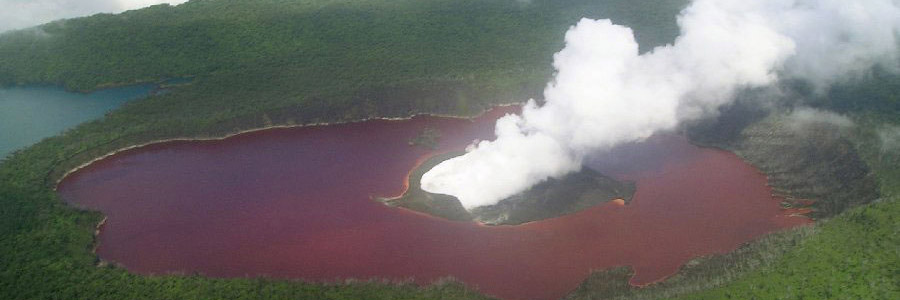 Lake Manaro turns red from volcanic activity in 2006. Last week, the volcano forced thousands to evacuate Ambae island in Vanuatu. ©Conradh, 2006.
Lake Manaro turns red from volcanic activity in 2006. Last week, the volcano forced thousands to evacuate Ambae island in Vanuatu. ©Conradh, 2006.
The past few weeks have brought a whirlwind of heartbreaking disasters. In late August, Hurricane Harvey wreaked immense damage in Houston and other areas. Soon after, Hurricane Irma destroyed large swathes of Florida and the Caribbean, followed by Hurricane Maria, which decimated Puerto Rico and other already suffering islands nearby.
The destruction wasn’t limited to a particularly battering hurricane season, though. In that same timeframe we’ve seen not one, but two, earthquakes devastate Mexican cities. And then, of course, there was a wide range of cascading disasters that followed—from power grid failures to the pollution-filled floodwaters to the threat of dam failures.
The intensity of the damage of these events made it difficult to keep up with other disasters that also wrought havoc—a deadly hepatitis A outbreak in California, thousands evacuated from a volcano threat in Vanuatu, and devastating wildfires throughout the Western United states.
As we at the Natural Hazards Center have watched this spate of recent disasters unfold, our hearts have gone out to those suffering—but so have our minds. We’ve been working with journalists to make sure they have solid information to share with the public. We’ve mobilized researchers to collect perishable data through our Quick Response Grant Program. We’re also piloting a new publications series called Research Counts that we hope will help bring the lessons of past disasters to bear on current events.
In this issue, you’ll find news of the many things we’ve been working on along with the same great resources, jobs, and announcements we always share. Thank you for your support and for the work you do. We appreciate your readership.
Sincerely,
Jolie Breeden Editor, DR—Disaster Research News You Can Use
Jolie Breeden is the lead editor and science communicator for Natural Hazards Center publications. She writes and edits for Research Counts; the Quick Response, Mitigation Matters, Public Health, and Weather Ready Research Award report series; as well as for special projects and publications. Breeden graduated summa cum laude from the University of Colorado Boulder with a bachelor’s degree in journalism.